
Natalie Morales, an openly queer actor and director known for hit TV shows like Parks and Recreation, Room 104, and Abby’s–for which she made history as playing the first bisexual lead in a TV comedy–excused herself from her neighbor’s boisterous backyard construction work when she answered the phone call from Queerty.
“Taco, come on inside.” She beckons to her rescue dog, whom she adopted from the Utah-based nonprofit organization Best Friends Animal Society. Morales finds a quiet spot inside where we can discuss queer identity and her new projects, Dead to Me, The Morning Show, and I’m Totally Fine.
In the third and final season of Dead to Me – a Netflix series about the power of female friendship sans the need for male counterparts, romantically and platonically – which premiered last week on Netflix, Morales reprises her role as Michelle, the queer love interest of Linda Cardellni’s Judy Hale.
A beautiful, thrilling, and heartbreaking tale of murder, revenge, love, loss, and regret, lesbian creator Liz Feldman has crafted a show for the ages. Here’s what Morales has to say about the third and final season…
How about we take this to the next level?
Our newsletter is like a refreshing cocktail (or mocktail) of LGBTQ+ entertainment and pop culture, served up with a side of eye-candy.
QUEERTY: What does it mean to be playing another queer character in Dead to Me season three?
MORALES: I don’t delight in being pigeonholed. But I am very thankful when it is accurate representation. And with Dead to Me, what I love so much–and Liz Feldman, who is the creator, is an out lesbian–it was important to her that it felt real and authentic and that the relationship between them didn’t feel forced. And I really love being a part of that. And anytime there’s good representation for us on TV or in movies, it just helps to continue to normalize this for people who are watching it, especially on a super popular show like Dead to Me. If people are going to pigeonhole me as a hot lesbian who gets a lot of women, it’s not the worst. But I would rather be able to play a range of things.
Linda Cardellini’s character is also queer in Dead to Me. The other week, she discussed Velma from Scooby-Doo’s lesbian identity finally being canon. It was always quite obvious.
If I remember correctly, it was even more overt and very clear. And the studio at the time cut those scenes, which is a shame. but I’m glad everyone still saw through it. I’m not going to name names, but I have read scripts that, when they get made and I see the movie, the queer character or storyline is cut out. And that’s recent still. So it happens all the time.
Speaking of, behind the camera, what kinds of stories do you want to tell?
I would like to continue to challenge myself and do things that I have not done before. I’d like to keep doing different things. I want to just have the opportunity to be trusted with as many different kinds of genres and stories as my male peers tend to. And I want to do as much as I can get away with.
What was your queer-awakening film growing up?
Probably Cruel Intentions. But there was certainly TV before that, also involving Sarah Michelle Gellar, [like] Buffy.
And queer-awakening musician or band?
For so long, when you’re queer and you don’t really know it or you’re trying to deny it, you have this thing where you’re like, “Do I like them, or do I just want to be like them?” I was going to say Hanson, but it’s a bad joke. But it’s not far from the kinds of women I ended up liking.
Here are a few rapid-fire questions: Dream filmmaker collaboration?
Mike Mills. He’s great. Maybe [he’ll] read [this] and we will do something together.
10 Things I Hate About You or Can’t Hardly Wait?
I just saw Can’t Hardly Wait again recently, and it’s really good.
Dateline, Queer Eye, or Bravo?
Queer Eye.
View this post on Instagram
In your coming out essay, you spoke about a double standard of how gay men were more acceptable growing up than lesbians on screen. Do you think that has shifted?
A little bit but not enough. There’s a lot more stereotypes about lesbian women or queer women or queer people in general, but I’m hoping it changes. It mirrors how many lesbian bars there are in the United States. There’s literally zero. There’s so much more exposure, opportunity, and platforms for gay men. I hope that our fellow queer men will extend a hand and shine a light on us as well because there’s some misogyny inherently in that. And I hope that changes.
You also mentioned in your essay that you didn’t have Pride in school.
Having Pride stuff happening in school is maybe common for L.A., New York, and some other cities. But there’s a lot of cities still in America where that is not a thing. And, hopefully, it keeps improving the way it has. It’s a big reason I do what I do. Not only do I enjoy it, but it’s also a way to be in people’s lives that may not know people like you. And then it becomes a little more normal, and you go, “I know what a non-binary person is. I’ve seen Jonathan Van Ness. I like them. I relate to them.” That is invaluable. People can reject the fear narratives that are put upon them when they’ve seen it for themselves.
Speaking of school, I have two nieces, 12 and 14, who are queer and still navigating their identities. Do you have any advice for people their age?
I would say if they can either stay off social media or keep their social media private so that it’s just their friend group as long as possible, they will be thankful for not having their teen years online later on. And potentially dangerous people might take advantage of them being in an exploratory state in their life. What I learned as an adult is that the coolest and the most popular people are the people who are unabashedly themselves. Even if you’re the biggest nerd, if you don’t care that people don’t like what you like and you still like it, people respect that. If I could go back and tell myself that, I probably wouldn’t have believed myself. And a lot of it has to do with me being neurodivergent and just not knowing where and how I fit in and if I even need to fit in. It felt very important to fit in, not for popularity, but to have community, which is a necessary part of life. I would have told myself that I could find my community eventually by just being true to myself.
View this post on Instagram
What can Hollywood do better to achieve Latinx parity?
We’re such a big percentage of this country. I don’t see a lot of Latinx representation in general, with the exception of the sassy friends a lot of the time. As a queer Latinx person, I am grateful to be a part of any small step that it is taking because it is my industry. I keep trying to prioritize telling stories about marginalized people that are not necessarily only about how they are marginalized, because there’s so much more to us and it’s also more accessible and relatable that way. And if we look around and represent the population more accurately, it isn’t that hard to do. And it doesn’t have to be some specialized diversity program. There’s a lot of extra effort being put into something that should be so easy. I’m glad the effort is being put in, but once we get to a place where there’s actual parity–and I do hope and believe we will get to that place–we’ll look back and go, ” Why was it so hard?” It’s going to feel like when we hear that there used to be cocaine in Coca-Cola.
As a person of color, Aladdin was the only thing I could relate to on screen growing up. That’s only marginally changed.
Same. I was like, “Princess Jasmine is brown. She’s like me.” That was my favorite princess.
Speaking of the big screen, your new film, I’m Totally Fine, is amazing. Does your character, an alien, transcend human identity labels?
I don’t know that the alien is any particular sex or that sex works that way where the alien’s from. I pictured it as a blob with one femur bone in it. What I liked about the movie is that it is this allegory for whatever you want it to be. Nobody refers to the alien; nobody talks to the alien. Is the alien all in her head? Did it actually happen? Is it all Vanessa’s [Jillian Bell] way of getting through this? It’s something you notice on a re-watch. I love when there’s a comedy that can also make you cry. I feel the most connected to my human self when I am laughing and also crying at something. It’s the most cathartic relief you can have. You feel so free.
Likewise. Are there any upcoming projects that have you stoked?
I’m doing The Morning Show, and I haven’t really filmed much of it yet. I’ve only shot one scene from one episode, so I’m excited to continue to do that.


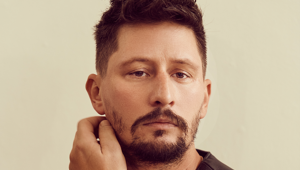
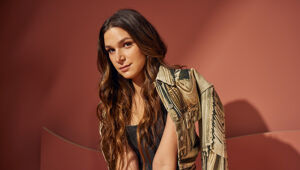
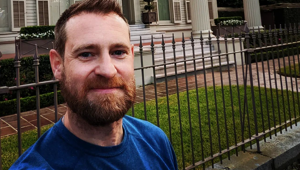
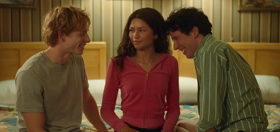

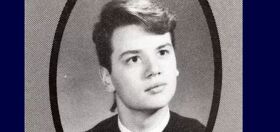

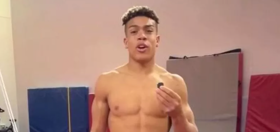

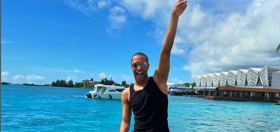
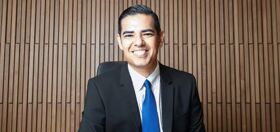
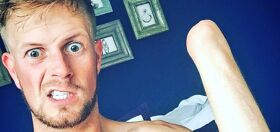
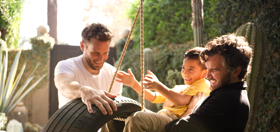
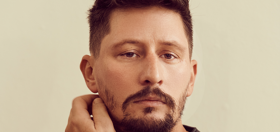

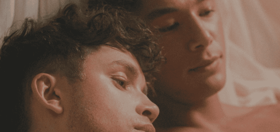
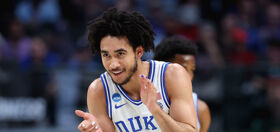
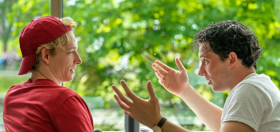
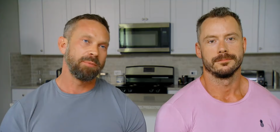
CatholicXXX
Latin, Latino, or Latina. There is no such thing as “Latinx”
RIGay
Thank you! I was about to reply the same thing!
Ronbo
Yes, Queerty eXtremists are always creating new terms to divide and separate us from each other and our supporters. (eXtremists..clever huh…) Maybe we could do the same to replace the primary purpose (insult) of the word “CIS” with ‘straightX’. When I heard that Granny was an insult to every grandmother, I assume the dividers prefer the word ‘grandX’.
X, it’s not just part of the alphabet, it’s a new way to insult, upset and cross-out common sense.
Van Der Hoor
Exactly… evidently the people using this kind of words have no understanding of the spanish language.
A_latin_1
Stop using Latinx. We are Latinos collectively, Latinas if it’s all women, and Latino/Latina separately.
RIGay
“Latinx” is not an adjective for the Latino population. It was invented out of the efforts of whatever culture (Gen-X?) felt it necessary to rebrand everything to make it sound “hip and now”. It falls on all fronts. Please stop using that adjective.
LumpyPillows
To pile on: when will the woke left wake up to the insult their nonsensical Latinx term causes Latino people? It’s just such a great example of the damage these pseudo intellectuals cause with their reinvention of a society that would only make sense in a comic book. A boring comic book at that.
Den
According to surveys, less than 10% of the Latino community uses or even likes the term latinx. It is mostly preferred by Anglos apparently. It is like using the term folx instead of folks. Silly and tonedeaf.
Most of the people from central and south America would prefer to be referred to by their country/culture of origin if known or as latino if not known. They are not a monolithic group, even the nature of the Spanish they speak varies quite a bit. And let’s not forget many speak Portuguese or their first language is an indigenous one.
thebaddestbabby
the article I saw (“About One-in-Four U.S. Hispanics Have Heard of Latinx, but Just 3% Use It”) has much more damning numbers:
– 23% of adults who self identify as Hispanic or Latino have heard the term Latinx
– 3% of that category is people who actually uses the term Latinx
– a whopping 76% of Hispanic/Latino/Latina people have not even heard the term (at least, in 2019 when the research was conducted)
– 1% non response
Zenzuva
“There’s so much more exposure, opportunity, and platforms for gay men.”
This has to be a joke.